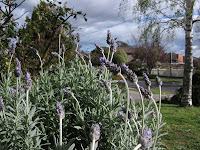



I mentioned in the previous blog post that the yield for honey wasn’t looking too promising this year and that the bees had better work harder from now on. Even then it’s probably a bit too late.
This spring has made its way out for summer too quickly. Since last week the maximum temperature in Melbourne has stayed above 30 degrees and this week will see more of the same in the second half. It wasn’t so long ago that we seemed to have gone back to winter back in late September to early October, but six weeks since we’re experiencing some consistently warm to hot weather that a standard Melbourne summer may not even offer! (Melbourne’s summer goes through a series of cool to extremely hot days, but it is rare to see more than four hot days in a row with maximum temperatures above 30. It is even not so unusual to have one or two weeks staying on the cool side, disappointing those craving for some summer action. So this kind of a heat spell is not even typical for the summer here.)
The fluctuating spring weather sets the scene for an ever changing floral display in the neighbourhood. Some flowers came and went in a blink like the frequently passing spring rain (but fortunately they stayed long enough to be captured by my camera shots in my spare time; you may see them at this other website or elsewhere in this blog.) On the other hand, some flowers were very persistent and stayed in bloom since the start of spring until now. The flowering season draws to an end when it’s the turn of the roses to bloom. While the roses usually take their time to blossom, their flowers last quite a long time till early summer. But this year, the white roses and other light-coloured ones seem to have wilted so quickly, just two to three weeks since blossoming, probably because the heat was too much to bear. Fortunately for the bees, there are still the pink and red roses left if they are after more nectar.
The unseasonal weather is also affecting crop growth and people’s health. According to a news report last night, wheat and other cereal crops have to be harvested earlier than usual as they have ripened prematurely. Wild grass has grown more prolifically than usual in the countryside to the north of Melbourne thanks to the rain that accompanied the colder weather in September/October. When it warms up now the grass flowers and infests the air with pollen that gets spread to town with the northerly wind. People have thus been warned of a hay fever season that would be the most serious out of recent years. This is certainly not good news for the sufferers, especially for someone who has been spared of the worst of hay fever in Germany for the last three years. But it seems that I can’t run away from it forever, especially now that I’m in Australia again. Such a pain.



上回說到今年蜂蜜收成或不太好,鄰家的蜜蜂得加把勁,不過現在努力也可能有點遲。
今年春天熱得太快了,自上週起墨爾本的每日最高溫度都不少於三十度,本週後期仍會如此炎熱,回想起九月底至十月中旬,發起冷時更甚於冬天,想不到六星期後,天氣比正常的夏天熱得更持久!(墨爾本的夏天時涼時熱,甚少超過連續四天高於30度,甚至有時連續一、兩個星期都是清清涼涼,叫喜愛夏日者失望,所以這樣連續兩週炎熱的日子,就算是一般夏天也不常見。)
春天隨了天氣飄忽,也是百花輸替盛放之時,有些一瞬即逝,開花後不出一兩場雨便凋零,正應驗古人說的「花開堪折直需折」(對喜歡攝影者來說,正是「花開堪拍直需拍」,有興趣可看另一個網頁及本網頁的照片),有些則由春天伊始一直綻放至今,到玫瑰逐漸開花便差不多是尾聲,平時玫瑰雖然開得慢但很耐久,一直開至初夏,但現在四周的白玫瑰和其他淺色玫瑰,開了三兩週便開始凋謝,相信是抵不住異常炎熱的天氣,幸好粉紅玫瑰和紅玫瑰仍未遭殃,蜜蜂要採蜜便得趕快了。
天氣異常,農作物和人們的健康也受影響,昨晚新聞謂,由於天氣熱,小麥和其他榖物早熟而要提早收割,擔心影響收成,而九、十月交替之時,天氣轉冷之餘下了不少雨,最近天氣一熱,北面的草原的草遍地開花,一刮起北風便飄來大量花粉,而今年花粉濃度特別高,令一眾患花粉症的人喊苦連天,我在德國舒服了三個夏天(雖仍擺不脫花粉症但徵狀總算輕微)在澳洲又回到現實,再次受苦了。




Comments
過着冬天的我們想象不出你們的夏天,不過花園好漂亮啊~~~
璟璟:其實我家附近不少花園都很漂亮,春天時真令人目不暇給。